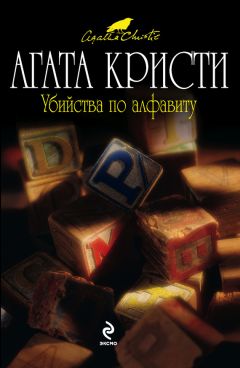Agatha Christie - Английский язык с Агатой Кристи. Убийства по алфавиту
This last flare-up came (эта последняя ссора вышла: «последняя вспышка /гнева/ вышла»; flare — сверкание; вспышка) because she'd told Don (потому что она сказала Дону) she was going to Hastings to see a girl pal (что поехала в Гастингс навестить подружку) and he found out (а он выяснил) that she'd really been over to Eastbourne with some man (что она на самом деле была в Истборне с каким-то мужчиной). He was a married man (он был женатым человеком), as it happened (как выяснилось: «случилось»), and he'd been a bit secretive about the business anyway (и хотел скрыть это дело: «и он был скрытен немного в этом деле в любом случае»; to secrete — выделять; прятать, скрывать, укрывать) — and so that made it worse (и так это сделало все еще хуже). They had an awful scene (у них была ужасная сцена) — Betty saying that she wasn't married to him yet (Бетти говорила, что она еще не была за ним замужем) and she had a right to go about with whom she pleased (и имела право ходить/гулять, с кем она хотела; to go about — передвигаться) and Don all white (а Дон /был/ весь белый) and shaking (и трясущийся) and saying (и говорил) that one day (что однажды) — one day — "
heart [hɑ:t], flare-up [ˈflɛǝrʌp], secretive [sɪˈkri:tɪv]
"There was one row nearly a year ago and another — a worse one — just over a month ago. I was home for the weekend — and I got them to patch it up again, and it was then that I tried to knock a little sense into Betty — told her she was a little fool. All she would say was that there hadn't been any harm in it. Well, that was true enough, but all the same she was riding for a fall. You see, after the row a year ago, she'd got into the habit of telling a few useful lies on the principle that what the mind doesn't know the heart doesn't grieve over.
This last flare-up came because she'd told Don she was going to Hastings to see a girl pal and he found out that she'd really been over to Eastbourne with some man. He was a married man, as it happened, and he'd been a bit secretive about the business anyway — and so that made it worse. They had an awful scene — Betty saying that she wasn't married to him yet and she had a right to go about with whom she pleased and Don all white and shaking and saying that one day — one day — "
"Yes?"
"He'd commit murder (он совершит убийство) —" said Megan in a lowered voice (сказала Меган пониженным голосом = понизив голос; to lower — опускать, понижать).
She stopped and stared at Poirot (она остановилась и уставилась на Пуаро).
He nodded his head gravely several times (он кивнул головой серьезно несколько раз). "And so (и так), naturally (естественно), you were afraid (вы боялись) …"
"I didn't think (я не думала) he'd actually done it (что он действительно сделал это) — not for a minute (ни на минуту)! But I was afraid (но боялась), it might be brought up (что это могло всплыть; to bring up — приносить наверх; делать известным) — the quarrel (эта ссора) and all that he'd said (и все то, что он сказал) — several people knew about it (несколько человек знали об этом)."
commit [kǝˈmɪt], lowered [ˈlǝʋed], quarrel [ˈkwɔrǝl]
"Yes?"
"He'd commit murder — " said Megan in a lowered voice.
She stopped and stared at Poirot.
He nodded his head gravely several times. "And so, naturally, you were afraid ."
"I didn't think he'd actually done it — not for a minute! But I was afraid it might be brought up — the quarrel and all that he'd said — several people knew about it."
Again Poirot nodded his head gravely (снова Пуаро серьезно кивнул головой). "Just so (именно так). And I may say, mademoiselle (и я могу сказать, мадемуазель), that but for the egoistical vanity of a killer (что если бы не эгоцентрическое тщеславие убийцы), that is just what would have happened, (это как раз то, что могло бы произойти). If Donald Fraser escapes suspicion (если Дональд Фрейзер избежит подозрения), it will be thanks to A.B.C.'s maniacal boasting (это будет благодаря маниакальному хвастовству убийцы Эй-би-си; to boast — хвастать/ся/)"
He was silent for a minute or two (он молчал минуту или две), then he said (затем он сказал): "Do you know (вы /не/ знаете) if your sister met this married man (встречалась ли ваша сестра с этим женатым мужчиной), or any other man, lately (или любым другим мужчиной недавно)?"
Megan shook her head (Меган покачала головой). "I don't know (я не знаю). I've been away (меня не было: «я была далеко»), you see."
egoistical [ˌi:ɡǝʋˈɪstɪk(ǝ)l], escape [ɪsˈkeɪp], boasting [ˈbǝʋstɪŋ]
Again Poirot nodded his head gravely. "Just so. And I may say, mademoiselle, that but for the egoistical vanity of a killer, that is just what would have happened. If Donald Fraser escapes suspicion, it will be thanks to A.B.C.'s maniacal boasting."
He was silent for a minute or two, then he said: "Do you know if your sister met this married man, or any other man, lately?"
Megan shook her head. "I don't know. I've been away, you see."
"But what do you think (но что вы думаете)?"
"She mayn't have met that particular man again (она, вероятно, не встречалась именно с этим человеком снова; particular — индивидуальный, отдельный, одиночный). He'd probably sheer off (он бы, вероятно, сбежал; to sheer off — уклоняться от курса; исчезать) if he thought (если он бы подумал) there was a chance of a row (что есть вероятность ссоры), but it wouldn't surprise me (но это бы не удивило меня) if Betty had (если Бетти) — well (ну), been telling Don a few lies again (опять наврала Дону: «опять наговорила Дону немного лжи»). You see (вы понимаете), she did so enjoy dancing (ей действительно нравилось танцевать) and the pictures (и /ходить/ в кино), and of course (и, конечно), Don couldn't afford to take her all the time (Дон не мог себе позволить все время ее водить)."
"If so (если так), is she likely to have confided in anyone (она бы наверняка доверилась кому-нибудь)? The girl at the café, for instance (той девушке из кафе, например)?"
"I don't think that's likely (я не думаю, что это возможно/правдоподобно). Betty couldn't bear the Higley girl (Бетти не выносила эту девочку, Хигли). She thought her common (она считала ее простой/вульгарной; common — общий, всеобщий; обыкновенный, простой; банальный, вульгарный; грубый, хамский). And the others would be new (а другие были новенькие). Betty wasn't the confiding sort anyway (Бетти в любом случае была не из тех, кто доверяется: «Бетти не была доверяющимся типом»)."
sheer [ʃɪǝ], surprise [sǝˈpraɪz], for instance [fǝrˈɪnstǝns]
"But what do you think?"
"She mayn't have met that particular man again. He'd probably sheer off if he thought there was a chance of a row, but it wouldn't surprise me if Betty had — well, been telling Don a few lies again. You see, she did so enjoy dancing and the pictures, and of course, Don couldn't afford to take her all the time."
"If so, is she likely to have confided in anyone? The girl at the café, for instance?"
"I don't think that's likely. Betty couldn't bear the Higley girl. She thought her common. And the others would be new. Betty wasn't the confiding sort anyway."
An electric bell trilled sharply above the girl's head (электрический звонок резко звякнул над головой девушки). She went to the window and leaned out (она подошла к окну и выглянула; to lean — наклоняться, нагибаться). She drew back her head sharply (она резко отдернула голову).
"It's Don (это Дон)."
"Bring him in here," said Poirot quickly (приведите его сюда, — быстро сказал Пуаро). "I would like a word with him (я хотел бы поговорить с ним) before our good inspector takes him in hand (прежде чем наш добрый инспектор получит его в руки)."




